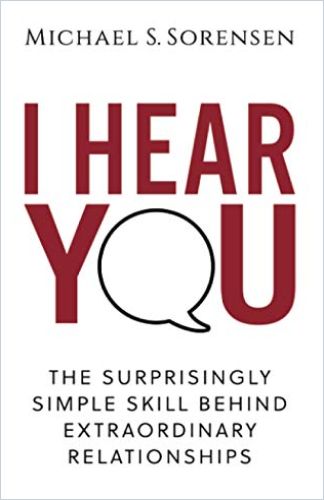Everyone wants to feel heard. Relationship coach Michael S. Sorensen explains how to show people you’re listening and why validation is a life-changing skill.

The Gift of Listening
Years ago, relationship coach Michael S. Sorensen was a self-confessed personal development junkie. By day, he worked as a marketing executive; in his spare time, he read and researched self-help material so he could apply it to his own life. This obsession eventually led Sorensen to share the transformative principles and skills he learned and verified – starting with the subject he found most powerful: the practice of validating others’ experiences and emotions.
Sorensen’s 2018 book, I Hear You: The Surprisingly Simple Skill Behind Extraordinary Relationships, reached #1 on Amazon and to date has garnered more than 8,500 five-star reviews. The book received the 2018 Independent Press Book Award and the 2018 Readers’ Favorite Award. The commercial success of I Hear You launched Sorensen’s second career as a thought leader, author, podcaster, speaker and relationship coach.
Turn Toward, Stay Together
At the heart of I Hear You is the insight that validation – that is, the act of helping another person feel heard, understood and affirmed – is vital for building and maintaining relationships of all kinds.
Sorensen cites the research of psychologist John Gottman, the author of The Relationship Cure, who described validation’s powerful effects. Gottman conducted a six-year study of 130 married couples and found that the couples who stayed together tended to display positive, engaging responses to each other’s bids for attention more frequently than those whose relationships fell apart.
The truly good listeners of the world do more than just listen. They listen, seek to understand, and then validate.Michael S. Sorensen
These bids for attention, Gottman observed, can occur scores of times each day. For example, a husband might say, “Wow, check out that car!” not so much because he thinks the car is interesting but because he desires his wife’s attention. If she responds positively to his bid for attention, as opposed to negatively or with passive disinterest, she’s effectively “turning toward” her partner. By observing couples’ bids for attention, Gottman was able to predict with 94% accuracy whether a couple would remain married or eventually divorce.
Build Relationships – and Influence
According to Sorensen, Gottman’s research demonstrates the critical role of validation in building and maintaining relationships. Sorensen details additional benefits of validation, too: reinforcing other people’s positive feelings of happiness and excitement, supporting their sense of satisfaction in a relationship, helping people reach decisions and take action, and strengthening your own ability to understand others’ emotions and perspectives.
When we sympathize, we feel for someone because of his or her pain. When we empathize, we feel the pain with them.Michael S. Sorensen
Validation, Sorensen says, is a way to defuse conflict, resolve arguments, offer support, and exhibit love and compassion. Receiving validation almost automatically alleviates people’s worries, fears and uncertainties. It has less altruistic benefits, too, Sorensen points out: People tend to respond positively to a person who provides validation.
Put Empathy First
Sorensen carefully explains what validation is and isn’t. Validation requires a listener to do two things, he says: First identify the emotion the speaker is feeling, and then express understanding and empathy for that emotion. For example, if a colleague confides to you that she’s worried because her daughter hasn’t texted her, your first instinct might be to offer reassurance: You might tell her she likely has nothing to worry about. Or you might extend advice, such as suggesting she call one of her daughter’s friends. While these are both well-meaning responses, they don’t offer the validation that will actually calm and reassure your colleague. To validate her concern, you might say something like, “I don’t blame you for being worried, especially if she told you she’d call an hour ago.” Saying this would show that you’ve heard your colleague’s concern and that you understand why she’s anxious.
More often than not, people who vent or complain already know how to handle their current situation – they’re just looking for someone to see and appreciate their struggle.Michael S. Sorensen
When you validate others’ emotions, you permit them to own those emotions, without labeling them as bad or good, Sorensen says. You don’t try to solve or sidestep the emotion; instead, you simply listen, accept and empathize. The result: a feeling of connection, greater calm on the speaker’s part and, often, a clearer view of the way forward.
Listen, Validate, and Validate Again
Sorensen acknowledges that giving validation won’t always be easy. After all, every conversation is unique and requires a bespoke approach. To clarify the process, he suggests a four-step method:
- First, listen empathically, paying attention to the speaker’s body language, tone of voice, and other nonverbal cues, and give your undivided attention.
- Second, when an opportunity arises, validate the speaker’s emotion. If you’re struggling to identify the emotion, ask the person how they’re feeling. You don’t have to agree with the emotion in order to validate it, Sorensen says; you only need to recognize and accept that the person has it.
- Third, Sorensen recommends offering encouragement or a word of advice, but only if it seems appropriate and welcome. Consider asking for the person’s permission to share your opinion and ideas, he says. Avoid using the word “but,” which people hear as canceling whatever statement preceded it. Use “I” statements such as “I disagree” rather than “you” statements, such as “You’re mistaken.”
- Fourth, to end the conversation on a positive, uplifting note, offer additional validation – for example, “Ugh, I don’t envy you. That really is a tough situation. It sounds to me like you have a good plan, though. Good luck with it.” You might also choose to validate the person’s vulnerability in sharing their emotions; for example, “I admire your courage in bringing this up and appreciate that you shared it with me.”
Simple and Potent
Sorensen’s brief, engaging and helpful book offers lessons that are immediately applicable in everyday interactions. Sorensen offers a simple and powerful antidote to a universal need for greater connection, understanding and authenticity in relationships. If the skill of validation becomes more widely practiced, it might just make the world a better place.













